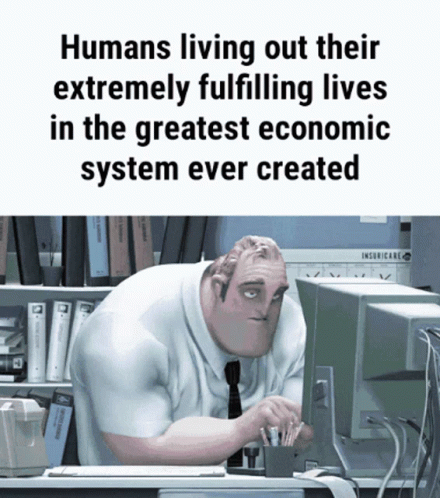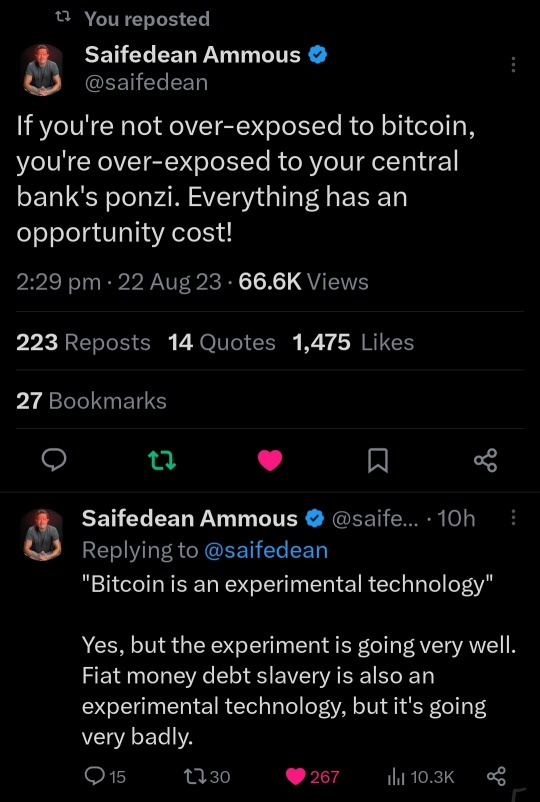#opportunity cost
Note
How do the people working in marketing know how effective their marketing is?

There's a whole field called Marketing Analytics that is dedicated to quantifying the results and context of marketing efforts. It is rare for companies to spend a large amount of money (e.g. on marketing budgets) without some means of measuring what they get from spending it. This measurement generally includes things like impressions, click-through rates, time spent engaging with the content, google searches for the marketed material, visits to the websites, view counts, average and median watch time, and so on. There are a lot of key performance indicators that analysts will track in order to measure how effective a specific marketing tactic is, and those performance indicators get compared to the cost of the marketing tactic to determine overall cost efficiency.
[Join us on Discord] and/or [Support us on Patreon]
Got a burning question you want answered?
Short questions: Ask a Game Dev on Twitter
Long questions: Ask a Game Dev on Tumblr
Frequent Questions: The FAQ
#business business business#video game marketing#the business of video games#where the money goes#opportunity cost
76 notes
·
View notes
Text
Always keep in mind that fear has an opportunity cost.
If you skip out on a thousand things because one of them might hurt you, that means you missed out on those one thousand things.
Calculate accordingly.
#anxiety#opportunity cost#mental health#boy can't wait for people to potentially misinterpret this one#but I couldn't find a better way to put it without giving a bunch of examples that someone would still be able to poke a bunch of holes in
9 notes
·
View notes
Text
Now that the zine has been sent to everyone (it is absolutely gorgeous!) I’ve posted my @sttermsofservice zine fic!
Opportunity Cost
Jim gazed at him for several seconds, emotions warring on his face. When his expression finally settled, there was something tender in his eyes as he placed a hand on Spock’s arm. “What about my priorities, hm? What if I need you to be okay? Spock, you know I—” He cut himself off and shook his head, crossing his arms in front of him. Spock missed the warmth of his hand immediately.
Or: Starfleet asks a lot of Jim and Spock, and they ask even more of themselves. In all of that, is there a place for the two of them together? What do they risk by taking the next step? What do they risk by staying in this nameless almost-something?
Be sure to check out everyone else’s fics and art as they are posted!
16 notes
·
View notes
Text
The Philosophy of Scarcity
The philosophy of scarcity is a perspective or worldview that centers on the belief that resources are limited and insufficient to satisfy all human wants and needs. It acknowledges the fundamental reality that there are finite resources available in the world, and that individuals, organizations, and societies must make choices about how to allocate these resources among competing uses. The philosophy of scarcity influences attitudes, behaviors, and decision-making processes in various aspects of life, including economics, politics, and social relations. Here are some key aspects of the philosophy of scarcity:
Resource Limitation: At its core, the philosophy of scarcity recognizes that resources such as land, labor, capital, and raw materials are limited in supply relative to the demand for them. This scarcity of resources necessitates trade-offs and choices about how to allocate scarce resources efficiently and effectively to meet competing needs and desires.
Opportunity Cost: One of the central concepts in the philosophy of scarcity is opportunity cost, which refers to the value of the next best alternative forgone when a decision is made. Every decision involves trade-offs, and choosing to allocate resources to one use necessarily means sacrificing the opportunity to use those resources for other purposes.
Competition and Allocation: Scarcity leads to competition among individuals, organizations, and nations for access to limited resources. In economic systems, markets play a central role in allocating scarce resources through mechanisms such as price signals, supply and demand dynamics, and market mechanisms. Government intervention and regulation may also influence resource allocation in response to perceived market failures or social objectives.
Rational Choice Theory: The philosophy of scarcity is often associated with rational choice theory, which posits that individuals make decisions based on rational calculations of costs and benefits to maximize their utility or satisfaction given limited resources. Rational decision-making involves weighing the benefits and costs of different options and choosing the one that yields the greatest net benefit.
Scarcity Mindset: Beyond its economic implications, the philosophy of scarcity can manifest as a scarcity mindset, characterized by a pervasive sense of lack or insufficiency. Individuals with a scarcity mindset may feel anxious, competitive, and preoccupied with acquiring and hoarding resources out of fear of deprivation or loss. This mindset can influence behaviors related to consumption, saving, and interpersonal relationships.
Distributional Justice: Scarcity raises questions about fairness and distributional justice in the allocation of resources within societies. Debates over economic inequality, poverty, social welfare programs, taxation, and redistribution policies often reflect competing values and principles regarding how scarce resources should be distributed to ensure equitable outcomes and promote social cohesion.
Environmental Sustainability: The philosophy of scarcity also intersects with concerns about environmental sustainability and the finite carrying capacity of the Earth's ecosystems to support human populations and economic activities. Addressing environmental degradation, resource depletion, and climate change requires recognizing and mitigating the impacts of resource scarcity on ecological systems and future generations.
Overall, the philosophy of scarcity underscores the importance of recognizing and addressing the inherent limitations of resources in human societies, and the need for thoughtful decision-making and resource management strategies to navigate the challenges posed by scarcity.
#philosophy#epistemology#knowledge#learning#chatgpt#education#ethics#economic theory#economics#scarcity#Resource scarcity#Opportunity cost#Competition#Rational choice theory#Scarcity mindset#Distributional justice#Environmental sustainability#Economic decision-making#Market allocation#Social welfare
2 notes
·
View notes
Text
Should you leave? | When to walk away...
youtube
2 notes
·
View notes
Text
#opportunity#cost#neuralnetworks#neural network#neurals#networks#neural networks#opportunity cost#opportunity cost neural networks
3 notes
·
View notes
Text
After quitting residency midway, naging freelancer 'yung isa kong ka-work ngayon. Napag-usapan namin 'yung venture capitalists abroad. Ang taas din talaga ng risk appetite nila. Ang tanong ng isa ko pang ka-work, saan nila nakukuha ang pera nila?
Knowing na antagal bago mag-ROI minsan, or talagang flop 'yung ibang iniinvestan nila, paano nila napopondohan 'yung pasahod sa mga hinahire nila?
Dun nga sa isang part-time job, nag-upload 'yung boss ng "financial report" na monthly inuupdate. Base doon, lugi ang company for two months na. Dalawa lang naman ang expenses: pasahod and paid tools. Tapos, sa money in the pot for profit-sharing, negative din, nag-out-of-pocket pa siya. I don't know what that means—nag-out-of-pocket siya para ma-cover ang expenses? Pero the numbers don't match.
Also, I think nag-eexpand 'yung company since naghahanap sila ng paid ads specialist, lead gen, and other job titles na hindi familiar sa akin. For now, pinapatulong kaming lahat sa lead gen out of the goodness of our hearts (charot) and I think madali lang naman siya. I'm trying to automate 'yung pag-scrape ng email addresses ng potential clients pero I'm failing so far. Hahahaha. Mas mabilis pa i-mano-mano.
I wonder kung may lead gen na trabaho na hindi ko kailangan tumawag sa clients. Mauubos energy ko sa ganu'n. Pero kung maghahanap lang ako nang maghahanap, kaya ko naman 'yung gawin. Oh well. May can-do-complex ako na parang dapat alam ko gawin lahat. Obviously I can't. And wala na akong time. So I need to stop. Pero probably I can learn it some day, some time.
Gusto ko ring mag-invest pero I've found na napaka-conservative ko!!! 'Di ko alam if personality or mindset or kulang lang sa sahod. If 200,000/month ang sahod ko, mas magiging aggressive na ba ako? Parang hindi pa rin e, kasi pera na naging bato pa ang peg. Mukhang iti-time deposit ko na lang lahat... hahaha pero sayang 'no. No risk, no reward.
6 notes
·
View notes
Text
Opportunity Cost & AI
[An off-the-cuff essay no one asked for but I word-vomited anyway because I am exhausted]
I literally started a Python coding course on Friday so that I can ask ChatGPT or other AI tools to write me scripts to execute basic, tedious tasks that currently take up an absurd amount of my time.
I work a highly-paid role that’s supposed to be very strategic, but I’m easily spending 40-60% of my time executing repetitive, tactical tasks across multiple, disparate systems because my company (and every company prior—it’s not unique to this place) won’t pay for productivity software, automation plug-ins for our project management software, actual project managers, or additional junior headcount, our third-party agency partners don't have access to work inside internal systems, etc. etc. etc.
People spend more than half their day doing busywork, according to survey of 10,000 plus workers | CNBC, 2022
“The amount of time office workers have to spend doing their primary job duties decreased in 2016, from 46% to 39%. When asked what gets in the way of work the most, workers say wasteful meetings (59%) and excessive emails (43%) are the biggest offenders.” U.S. State of Enterprise Work Report | Workfront, 2016-2017

If you take just my salary and calculate the opportunity cost there, it more than justifies the cost of at least one or two these tools—then multiply that by all of the other employees in the company with the same or similar barriers to actual productivity and it’s literally a no-brainer.
opportunity cost (noun) • the loss of potential gain from other alternatives when one alternative is chosen; can be implicit (intangible) or explicit (tangible, dollar amounts); often calculated as the difference between the return on investment (ROI) between the most profitable business decision and the current/chosen one.
Alas, almost every company I’ve been at or heard about from others is short-sighted when it comes to realizing opportunity cost—whether from the ROI on investments like software, ongoing training, professional development, employee satisfaction and retention, systems maintenance and technological upgrades, user experience, or bare minimum marketing strategies—because they “cost money.”
I’ve never understood this, because humans have an inherent loss-aversion cognitive bias—psychologically, we’re twice as motivated by avoiding potential loss than we are by pursuing potential gain, and we’re more likely to take risks to prevent loss. I suppose the problem is that the culture of busywork is so ingrained that it’s perceived as the baseline, where “increased” productivity is viewed as a potential gain, rather than decreased productivity as a major loss.

Hasn’t anyone ever heard of short-term pain for long-term gain?
So, please hit me up if you have ideas on how to leverage ChatGPT and other tools to do things like batch cloning Jira tickets and generating documentation from templates; managing an overflowing email inbox; logging system data into disparate, static spreadsheets instead of intelligent, connected systems; manually searching old Jira tickets to append implementation dates to that data; finding and replacing duplicative instances of copy that aren’t using global elements/a single database source for management; pulling, consolidating, and analyzing reports from multiple disconnected systems; etc.
I’m really, really tired of spending my time and energy on easily automated work that does not challenge me or contribute to my sense of pride or satisfaction in my work, but does radically waste my time and my employer’s money.
Let’s help each other automate some shit and work smarter, not harder. It’s 2023 and we have not made all of these technological advancements just to ignore them and perpetuate the arbitrary 40-hour work week.
If we can spend half the time or less to reach our goals at work, then we can actually focus on the strategic parts of our roles to move the needle and invest more time in ourselves. We have the tools to be able to spend more of our time on personal passions and pursuits, family and friends, travel, leisure, hobbies, community engagement, volunteering, political activism, exercise and health, financial planning and management, home improvement, or whatever is currently being neglected or would improve our quality of life, happiness, and in return, our contributions to our workplaces.
Automation is the future. Contrary to much of the fear-mongering around the topic of work automation, four out of five knowledge workers see it as a chance to rethink work in new and exciting ways. Sixty-nine percent believe work automation will give them back time to perform their primary job duties better. The only hesitation that exists seems to lie in how much of work will ultimately be done by machines and how much will still require the human touch.” The State of Enterprise Work, U.S. Edition | Workfront, 2017 - 2018
It’s literally a win-win—except, perhaps, for the politicians and systems of power that seek to limit our financial flexibility, ability to organize, and the security to push for change.

P.S. Call and email your representatives—repeatedly—and tell them you will donate, campaign, and vote for their opponents in the next election if they do not vote NO on The Restrict Act.
——————
More reading for the nerds:
“Digital workers won’t settle for bad tech - Nearly half of workers say they’re likely to leave their current job if they’re unhappy or frustrated with workplace tech. (49%)” The 2021 State of Work — How Covid-19 changed digital work. | Adobe Experience Cloud, 2022
“Wasteful practices and tools—namely email and meetings—continue to thwart worker productivity. As in years past, poorly used meetings and email topped the list of things that keep knowledge workers from getting work done, with U.S. workers having an average of 199 unopened emails in their inboxes at any given time. This report certainly makes the case that email has reached the limits of its effectiveness as a work management tool.” The State of Enterprise Work, U.S. Edition | Workfront, 2017 - 2018
Why Busywork Is Making Your Employees Spend Less Time Doing Their Actual Jobs | Inc., 2016
Opportunity Cost: Missing the Mark on Motivation for Two Types of Employees | Maxim Kind, LinkedIn, 2018
#ai#chatgpt#techcrunch#work smarter not harder#chatgpt news#work#work problems#jobs#productivity#40 hour work week#antiwork#the restrict act#tech news#tech#trending news#automation#busywork#opportunity cost#entrepeneurmindset#leadership#self care#corporate#4 day work week#burnout#workingfromhome#software#enterprise#hire an email assistant#project management#productivity tools
7 notes
·
View notes
Photo

#studyblr#notes#my notes#economics#economics notes#econ#econ notes#opportunity costs#opportunity cost#macroeconomics#microeconomics#macroeconomics notes#microeconomics notes#microeco#macroeco
4 notes
·
View notes
Text
Opportunity Cost and Preferences In the Daily Life of a University Student.

What exactly is opportunity cost?
Opportunity cost is the potential benefits that an individual or a business misses out on when choosing one alternative over the others. Opportunity cost is not just a fundamental concept in economics, but it is also a prominent component that dictates our everyday lives.
In your daily life, you are constantly confronted with decisions and choices, such as waking up early to attend lectures or sleeping in and watching recorded lectures later. This decision can lead to different outcomes and influence how your day is going to be. Sleeping in means that your day starts later and you have less time to accomplish what you set out to do that day, which can lead to you sleeping late and waking up later the next day just to repeat the same process until you decide to wake up early. This highlighted the concept of opportunity cost and its influences on other decisions/outcomes of your life.
I will now discuss the decisions made and the opportunity cost of my usual daily routine on a Friday. (These decisions are based on the choices that I made today at the time I am doing this project.)

On Friday, I have classes from 10:00 am- 2:00 pm and I tend to wake up around 6:30 am to eat and workout at the gym before going to class. This is the first opportunity cost that I faced.
Wake up early, eat, and work out.
Sleep in and work out later in the afternoon.
I decided to wake up early at the cost of some more sleep. However, if I chose the latter, I would have to make up for the missed gym session and spend time later to work out, costing me time that I could otherwise use to study for doing things that I enjoy. If I decided not to work out entirely that day, I would then be disappointed in myself. This illustrated the ideas of how decisions and opportunity costs can snowball into other effects that can further influence your day.
After working out, I have 3 options:
Cut the workout session short to shower and head to class.
Go home, shower, and head to class late.
Go the class and shower later.
I chose to shower and be late for class. The opportunity cost here is that I would miss out on some important information that the professor said at the beginning of the class. However, I can ask a friend to relay that information to me. So, there aren't any opportunity costs of being late to class aside from the guilt of walking in late.
After the lecture, have a gap period before a lab and I can choose between 2 options:
Relax by eating and watching YouTube.
Eat after I get home from lab and do homework.
But no one like to do homework so I often choose to relax before lab. From choice, I get to enjoy my time and the trade-off is I have to do my homework when I get home later, lessening my free time at home.
After lab, I have 3 options:
Be proactive and stay on campus in the library to complete homework.
Go home and rest.
Hang out with friends.
Going out with friends here would mean that I lose the time that I can rest and do homework as well as the money that I am going to spend while out with them. However, nothing is more important than some good quality time with friends so I decided to do homework and rest can wait while I hung out with my friends.
While going out, we got hungry and decided to find a place to eat. We narrowed it down to 3, In and Out, Korean BBQ, and ramen. We then decided what to eat by voting. I prefer In and Out over Korean BBQ, Korean BBQ over ramen, and In and Out over ramen. The trade-off of my preferences is that In and Out is cheaper but it is the farthest from where we were. Thus, the opportunity cost of my choice is that I would have to spend more time traveling further and in return, I save money to use it elsewhere. On the other hand, my friends all agree that they prefer In and Out over ramen, Korean BBQ over In and Out, and ramen over Korean BBQ. However, this preference is irrational (not transitive) as they contradicted themselves by liking ramen, their supposed worst option over Korean BBQ, their supposed best option. As a result, I was able to convince them to go to In and Out.
After the fun, I looked at the clock and it was already 8:00 pm and I hadn’t even started my homework assignments. So I hurried back home and started working immediately. This is the opportunity cost of my decision to eat and rest during the break on campus and hang out with friends afterward. As a result, I have to rush my homework, putting stress on myself and potentially getting a bad grade on the assignments. So in the end, I trade fun for stress as the opportunity cost of previous choices.
Now it is midnight, and I can either choose
Think about my mental health and sleep early.
Sleep late and be tired the next day.
And of course, like any college student, I decided to sleep late as it was the weekend after all. Staying up late allows me to catch up on video games while sacrificing my sleep which I would eventually regret when waking up the next day.
In conclusion, opportunity cost is crucial in decision-making not just inside of the economic world but also in your daily life. Understanding that time is a limited resource and you need to decide how you want to spend it to maximize productivity and enjoyment.
Econ 23, Tuesday 7:00pm
Name: Quan Le
SID: 71725028
0 notes
Text
Captain’s Log
Stardate 2024.04.08
Day 23
Today has been a battle. I woke up late, so we started behind. I have been researching possible life directions and am feeling a bit overwhelmed. I used to believe in my ability to make a difference, but after a year and a half of having my identity denied and being forbidden from doing anything related to control, I am traumatized. I have no trust in organized education or religion. Academia here is a political circus. The only thing I have any desire to do is outdoor retreats, but even that is a long road and a big risk—especially in this economy. I don’t know what to do.
All of that to say, I’m feeling stressed and being less than patient with the boys’ lack of focus. They are testing the waters to see what they can get away with. I’m being more strict than I usually am because I don’t want to end up sliding down the slippery slope of sloppy academics. Ah, alliteration—when was the last time I used you?
Writing would be a fun way to make money, but again, unless you’re pushing someone else’s agenda, it’s hard to be profitable. Writing truth has never been particularly lucrative.
We had a good afternoon with our slings yesterday. I revised the design using thick cloth straps for the pouches, and it worked famously. I even got to use the helicopter technique. Looked pretty awesome if I do say so myself. I’ll try to get video today. Simon has figured out the staff sling well enough to catapult one of our tennis balls into the woods far enough to get lost.
Might attempt the art museum again this afternoon. Every time we’ve tried thus far has been a bust. I’ve already had my major conflict with Simon today, so I’m hoping that’s out of the way. He seems to be okay at this point. He and Isaac are playing in the sunshine on the balcony for quiet time. We’ll see.
#alternative education#homeschool#online education#china#science fair#slingshot#direction#confusion#retreat#opportunity cost#writing#truth
0 notes
Note
In case of hypothetical rethink, is it possible to change parts of the plot by adding/removing game portions while the development phase already started or every plot related choice must be set in stone from the early stages of production and never altered?

Generally speaking, the further along in development the content is, the more costly it becomes to change that content. This is because we can't turn back the clock to refund any development time spent building that content, so changing it requires us to throw some amount of work away in order to build the new thing. It's a lot quicker and cheaper to change things while we're in the planning phase than it is when we've already built the environments, animated all the characters, and recorded all of the dialogue. We can't refund the recordings and demand the voice actors do it all again. If we want to record new dialogue, we need to pay for the voice actor, the studio recording time and staff, and any other associated costs.

Remember that budget and dev time are finite - we have to ship the game eventually. This means that every bit of content has a necessary point-of-no-return where we can't change stuff anymore because we lack the budget for it. This means that it is absolutely possible to change things, but it entirely depends on what those changes would cost. The more expensive the change is, the less probable the change becomes. The cheaper the change is, the easier it is to get in and later we can do it. Changing numerical values in the game is pretty easy, which is why we can change things even after the game has launched. Changing environments, animation, or dialogue is very expensive, which is why we rarely make those changes post launch.
[Join us on Discord] and/or [Support us on Patreon]
Got a burning question you want answered?
Short questions: Ask a Game Dev on Twitter
Long questions: Ask a Game Dev on Tumblr
Frequent Questions: The FAQ
20 notes
·
View notes
Text
The 'False Urgency Culture'
Typically this describes a culture in which speed trumps quality.
The cultural focus is on rushing to meet deadlines, rather than the quality of productive outputs.
Along the way there are significant costs for people, including re-work, relationship breakdowns through to burnout.
Unsurprisingly the problem begins at the top, whether it be an organisation or a team.
I have had people describe…

View On WordPress
0 notes
Text


#quotes#quote#bitcoin#twitter#saifedean ammous#what would jesus do#endthefed#end the fed#ponzi scheme#opportunity cost
0 notes
Text
Days of Empathy
Recently I was reviewing a difficult business situation with one of our company’s top problem-solvers. The challenge he agreed to tackle was similar to another he had turned around, and I asked him if his approach was likely to follow the same course. He is a thoughtful fellow with strong character and an abundance of pragmatism in his toolbox. He suggested he would focus without excuse or…

View On WordPress
#economic policies#emerging technology#empathy#Federal Reserve#Lahaina#Maui wildfires#mutually beneficial#news cycle#opportunity cost#path to innovation#value creation#walking the picket lines
0 notes
Text
Which course is the best in special education?
Determining the "best" course in special education depends on various factors, including individual interests, career goals, and the specific needs of the students you aim to support. Special education is a diverse field with a wide range of courses that cover different aspects of teaching and supporting students with disabilities or special needs. Here are some prominent courses in special education that are highly regarded:
Introduction to Special Education: This foundational course provides an overview of special education principles, laws, policies, and practices. It covers topics such as inclusion, individualized education programs (IEPs), assessment, and collaboration with parents and professionals.
Assessment and Evaluation in Special Education: This course focuses on various assessment tools, techniques, and strategies used to identify and evaluate students' strengths, needs, and progress. It explores formal and informal assessment methods and emphasizes the interpretation and application of assessment data in developing individualized interventions.
Differentiated Instruction: This course delves into strategies for adapting and modifying instruction to meet the diverse learning needs of students with disabilities. It covers instructional planning, curriculum adaptation, and the use of assistive technologies to create inclusive learning environments.
Behavior Management and Positive Behavior Support: This course addresses behavior management techniques, proactive approaches, and positive behavior support strategies. It equips educators with skills to promote positive behavior, prevent challenging behaviors, and implement effective interventions when necessary.
Collaborative and Consultative Practices: This course focuses on collaboration and consultation skills needed to work effectively with parents, colleagues, and related service providers. It explores techniques for team collaboration, conflict resolution, and building effective partnerships to enhance student outcomes.
Assistive Technology in Special Education: This course introduces educators to the various technologies and tools that support students with disabilities in accessing the curriculum and promoting their independence. It covers assistive devices, software applications, and adaptive equipment.
Autism Spectrum Disorder (ASD) and Inclusive Education: This course focuses specifically on understanding and supporting students with Autism Spectrum Disorder. It covers characteristics of ASD, evidence-based interventions, social skills development, and creating inclusive environments for individuals with ASD.
Transition Planning and Vocational Education: This course examines the transition process for students with disabilities as they move from school to post-school life. It covers vocational assessment, career exploration, transition planning, and the development of skills necessary for independent living and employment.
It's important to note that the availability and specific course offerings may vary across institutions. When choosing a course in special education, consider your interests, professional goals, and the needs of the population you wish to serve. It's also valuable to seek recommendations from professionals in the field or consult with academic advisors to select courses that align with your aspirations and provide a comprehensive understanding of special education practices.
#special education teacher#speech language pathology#education#california#special education#los angeles#arizona#connecticut#jobs#career#opportunity cost#job opportunity#special education jobs#education services
0 notes